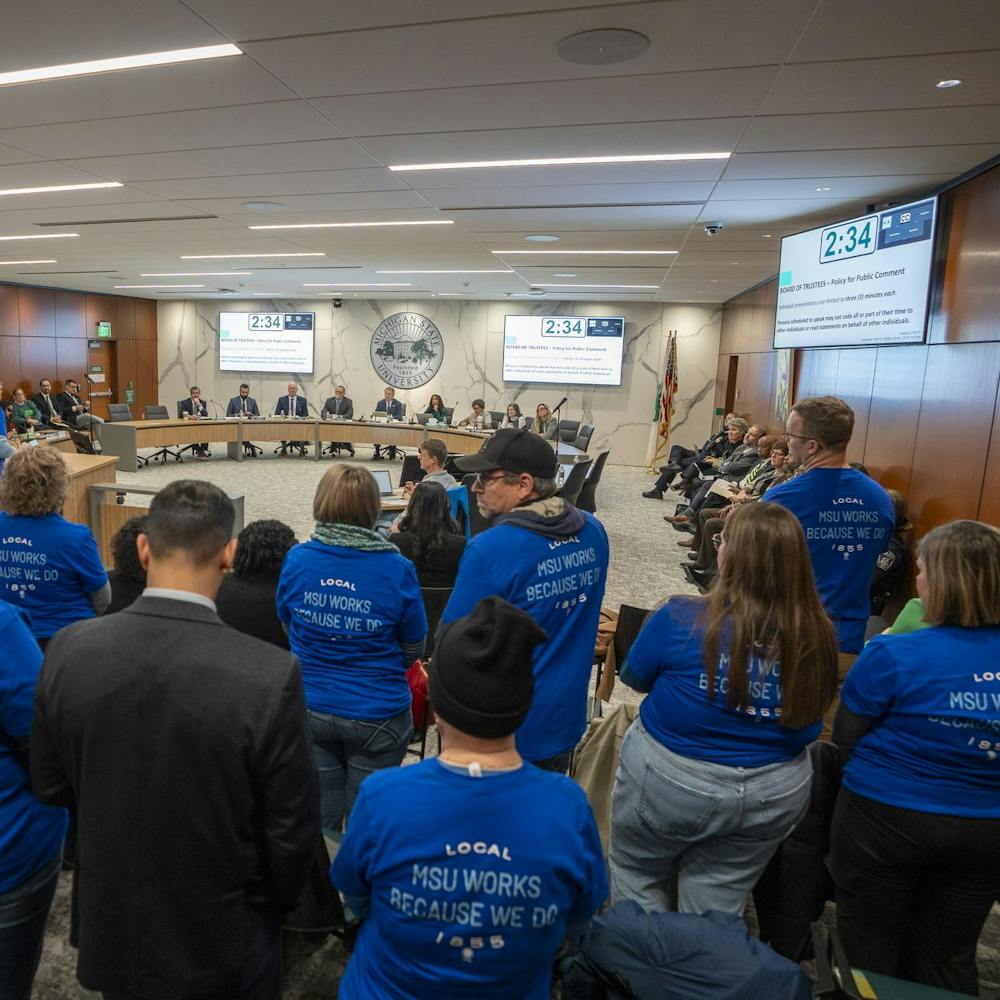During the summer of 2013, Cathleen Fry began her five and half years at Michigan State University as a graduate student working toward her Ph.D. While she was writing her dissertation, the university-wide fallout following the Larry Nassar cases began.
As a survivor, she felt MSU was failing them.
The 2018 graduate is not someone who can address the MSU Board of Trustees with ease. Currently living in New Mexico, Fry was in Michigan for a wedding the week of the latest board meeting.
She made her way to the Hannah Administration Building the morning of Oct. 25 to speak to the board and address their failure to follow through on the changes they said they would make when she sought them out the year prior.
"One year ago, I stood before you asking you to change the culture at MSU rather than making surface changes, making it look like things have improved," Fry said to the board. "Marginal improvements may have been made, but there's still a lot that needs to change here."
Fry also arrived to the meeting an hour early to protest, bearing 180 teal crocheted flowers. They were placed before the board prior to the meeting.
The flowers represent the 180-degree turn she feels MSU needs to take while handling and providing a culture of consent.
"It was clear to me that MSU didn't really have an awareness or a plan of how they were going to support the other survivors that were being re-traumatized by the fact that sexual assault was in the news all the time," Fry said. "That's my personal buy-in, but I've just seen so many different entities within the institution fail so many students in so many different ways."
She said MSU wasn't supporting survivors on the campus and didn't offer enough resources unless survivors were actively in crisis.
"Proper support for survivors is still lacking," Fry said to the trustees. "When I finished my doctoral dissertation, I was unable to do my best work. As a survivor, I was constantly being re-traumatized. I've achieved in spite of the harm of MSU, not due to its help."
Fry said she sought out support at the counseling center on campus, but they were unable to help her.
She said they tried to refer her elsewhere, but didn't explain what needed to happen for insurance to work. When she had problems with her therapist, she said she felt like she was at a loss.
"One was the concern about how we talk about survivors of sexual assault, to make sure we’re not just referring to people who were victimized, the terrible tragedy by those that were victimized by the perpetrator we know, but also of course the people at Michigan State University who have been victimized or who have been survivors as well," President Samuel L. Stanley Jr. said during a press conference while discussing key points from his three meetings with survivors of sexual assault. "I think it was really important to make sure that we’re not referring to survivors in one sense."
Despite currently living two time zones away, Fry's activism in regards to changing the culture at MSU has not stopped. It has simply changed platforms.
Fry uses Twitter to contribute to the fight she started at MSU.
She said she worked with the Graduate Employees Union a lot when it came to her activism on campus, citing it as the biggest factor that got her into activism.
"The Graduate Employees Union was the biggest factor because anyone that was having issues with their TA advisors would come to us," Fry said. "That was a great way to just see how terrible things were."
A change Fry has called for is to remove mandatory reporting. She finds the process harmful, especially because so many students work for the university, making them mandatory reporters.
Support student media!
Please consider donating to The State News and help fund the future of journalism.
"The reason I think the reporting system at MSU is problematic is ... as a grad student, I overlapped the student role and the staff role because I was a research assistant so I worked for the university and was also a student," she said. "I was assaulted in undergrad, and if I hadn't been able to talk to my friends about that, that would've been a problem. And most of my friends at MSU were employees as well, because they were also grad students and that — that's just a problem."
Fry told the board that the process of mandatory reporting is "harmful and takes away agency from the survivors" and that "seeking support from MSU staff should not have to result in an investigation that's always re-traumatizing and rarely leads to justice."
During Stanley's three meetings with survivors, the topic of mandatory reporting was brought up multiple times. While MSU is under federal regulations for mandatory reporting, he said it was a topic worth revisiting and thinking about as a campus.
"Many of the survivors talked to me about their concern, as we heard today from the presentation about mandatory reporting," Stanley said during a press conference. "They felt in some cases mandatory reporting was counterproductive; that it really increased trauma without often leading to a resolution."
Stanley spoke of the federal regulations MSU is under currently, but said it was something that needed to be talked about and re-looked into.
Before concluding her three minutes in front of the board, Fry also spoke on the recent acts of racism at MSU.
"If you want MSU to truly improve, you need to listen to us — all of us," she said. "Listen when we say the rut runs deep. There aren't just a few bad apples."
Discussion
Share and discuss “Alumna Cathleen Fry shares her story at board meeting, continues activism after graduating” on social media.







